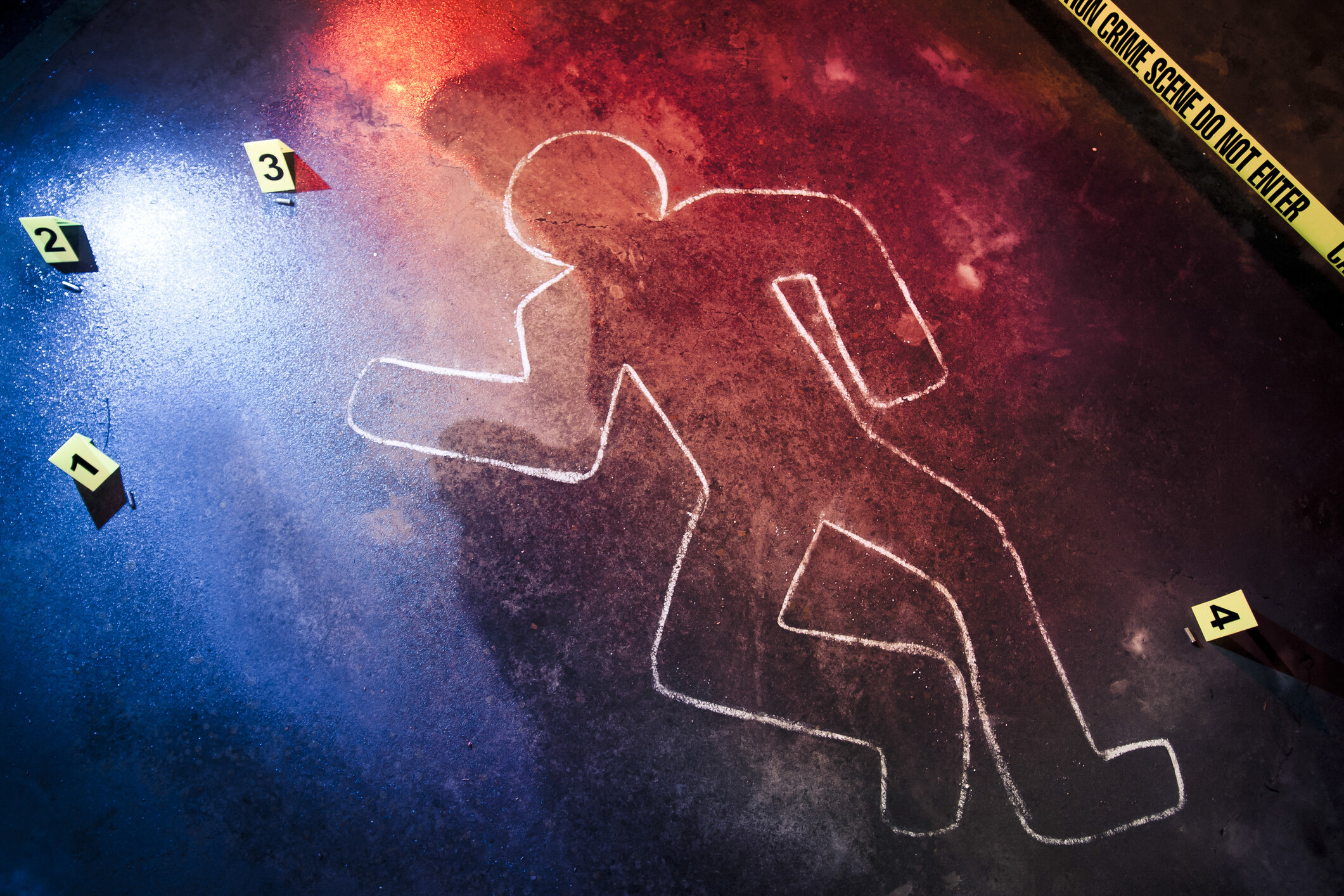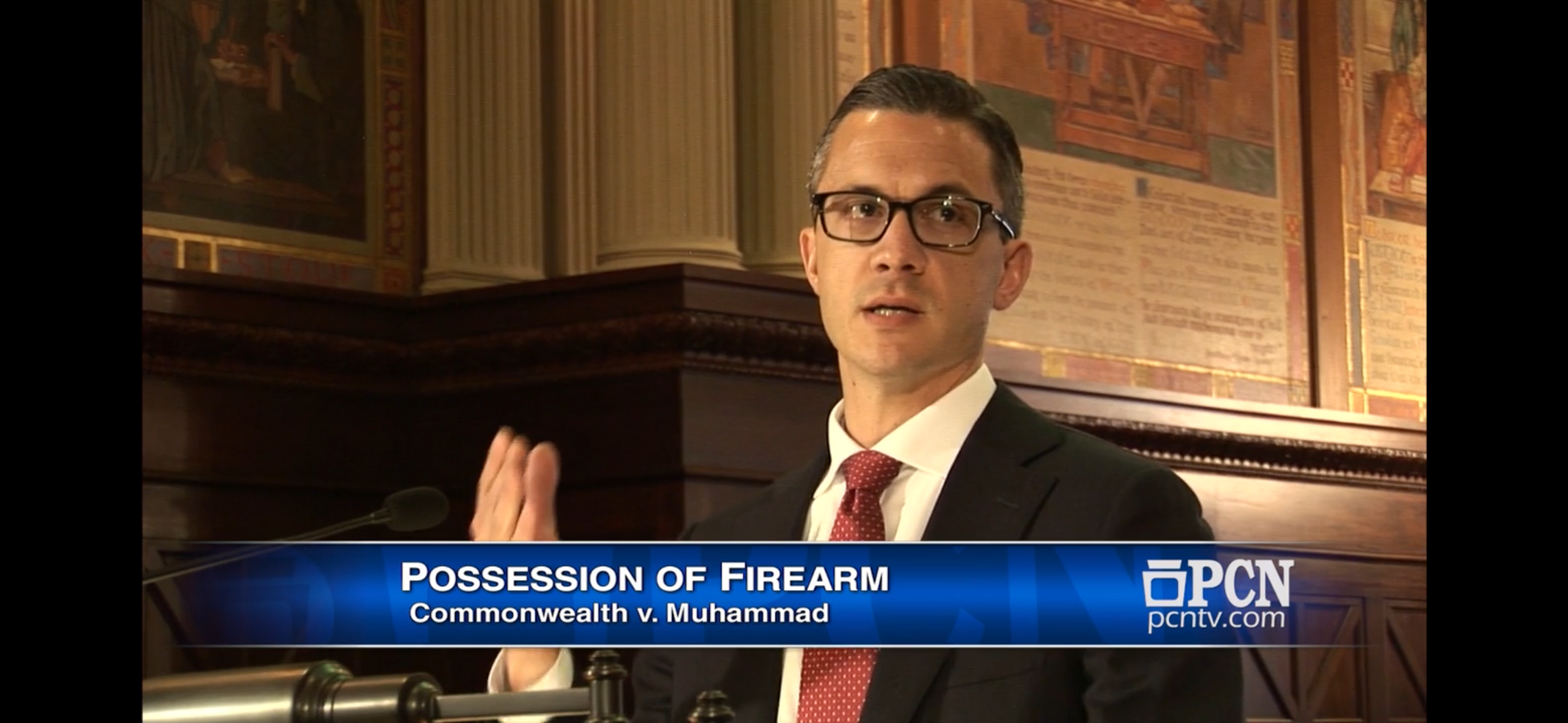
Philadelphia Criminal Defense Blog
PA Superior Court: Warrantless Search of Car Requires Suppression of Gun in Illegal Firearm Possession Case
Commonwealth v. Camacho
Philadelphia Criminal Defense Lawyer Zak T. Goldstein, Esquire
The Pennsylvania Superior Court recently decided the case of Commonwealth v. Camacho, reversing the trial court’s order denying the defendant's motion to suppress an illegal gun which was found in his car during a warrantless search of the car. The case illustrates the strict requirements police must follow in order to conduct a warrantless search of a car in Pennsylvania following the Supreme Court’s decision in Commonwealth v. Alexander.
The Facts of Camacho
On October 9, 2020, Pennsylvania State Police Troopers pulled over the defendant, Camacho, after observing him driving erratically in nearby Bucks County. Camacho pulled over on command. After the police stopped the car and approached it, the troopers noticed the smell of alcohol and marijuana. The defendant admitted he did not have a driver’s license. The troopers conducted a frisk of the defendant and found marijuana. The troopers also noticed an empty gun holster strapped to the defendant’s ankle. Naturally, they asked Camacho if he had a gun on him. He denied it. Despite Camacho's denial of having a firearm, the officers forcibly detained him after he briefly resisted. They forced him to the ground and handcuffed him.
With Camacho handcuffed and secured, the officers searched his vehicle without a warrant and found a loaded firearm under the driver's seat. The police formally arrested the defendant, and prosecutors charged him with:
Persons Not to Possess Firearms (VUFA § 6105)
Firearms Not to Be Carried Without a License (VUFA § 6106)
Resisting Arrest or Other Law Enforcement
Simple Assault
Recklessly Endangering Another Person
Possession of a Small Amount of Marijuana for Personal Use
Use or Possession of Drug Paraphernalia
Various Traffic Offenses
The Suppression Hearing and Trial
Prior to trial, the defendant moved to suppress the firearm, arguing that the warrantless search of his car violated his rights under the Pennsylvania Constitution. Federal law does not require the police to get a search warrant prior to searching a car, but the Pennsylvania Supreme Court has held that law enforcement officers must obtain a search warrant prior to searching a car unless an exception applies. In this case, the defendant argued that there were no “exigent circumstances” to justify the search because he and his passenger were restrained and in handcuffs at the time of the search.
The trial court denied the motion, agreeing with the Commonwealth that the presence of the empty holster and Camacho's earlier resistance justified the search. Camacho was convicted and sentenced to 4½ to 10 years in prison followed by a period of probation.
Superior Court Appeal
The defendant appealed to the Pennsylvania Superior Court. On appeal, Camacho argued that the police did not have any exigent circumstances to justify the warrantless search of his car. The Pennsylvania Superior Court agreed and reversed the denial of the motion to suppress.
The Superior Court emphasized that under Pennsylvania law, a warrantless search of a vehicle is only permissible when both probable cause and exigent circumstances exist. In this case, while the officers had probable cause to suspect criminal activity, the Court found that the Commonwealth failed to show exigent circumstances to justify the failure to get a warrant.
The Superior Court's Reasoning:
At the time of the search, Camacho was handcuffed, lying on the ground, and surrounded by multiple officers.
His passenger, Ms. Clark, was also handcuffed and secured in the police vehicle.
The car was parked on the side of a wide shoulder, away from traffic, and posed no immediate threat to the public or officers.
The Court determined that, with both Camacho and his passenger fully restrained, there was no risk that either one of them could access the vehicle or destroy evidence.
Additionally, the Court noted that there were at least six officers present at the scene, and they had discussed towing the vehicle. This indicated that they had sufficient time and personnel to secure the car and obtain a warrant.
Based on these factors, the Superior Court found that the situation no longer posed an immediate danger to officer safety or a threat of evidence destruction, meaning there were no exigent circumstances justifying a warrantless search. As a result, the Court reversed the trial court’s ruling, vacated Camacho’s conviction, and remanded the case for further proceedings. The Commonwealth will likely be unable to proceed with the case on remand.
The Takeaway
The Camacho case highlights the importance of challenging unlawful searches and seizures when the police search a car without a warrant. Even when the police believe they have probable cause, they must still obtain a search warrant or demonstrate that exigent circumstances justify an exception. This decision reinforces that without a valid justification, evidence obtained through warrantless searches should be suppressed.
Facing criminal charges or appealing a criminal case in Pennsylvania?
Criminal Defense Lawyer Zak T. Goldstein, Esquire
If you are facing criminal charges or under investigation by the police, we can help. We have successfully defended thousands of clients against criminal charges in courts throughout Pennsylvania and New Jersey. We have successfully obtained full acquittals and dismissals in cases involving charges such as Conspiracy, Aggravated Assault, Rape, Violations of the Uniform Firearms Act, and First-Degree Murder. We have also won criminal appeals and PCRAs in state and federal court, including the successful direct appeal of a first-degree murder conviction and the exoneration of a client who spent 33 years in prison for a murder he did not commit. Our award-winning Philadelphia criminal defense lawyers offer a free criminal defense strategy session to any potential client. Call 267-225-2545 to speak with an experienced and understanding defense attorney today.
PA Superior Court: Evidence of Subsequent Shooting Too Prejudicial to Admit to Prove Consciousness of Guilt in Murder Case
Philadelphia Criminal Defense Lawyer Zak T. Goldstein, Esquire
The Pennsylvania Superior Court has decided the case of Commonwealth v. Carter, holding that the trial court properly excluded evidence that the defendant shot someone else who was potentially involved in the murder with which he was charged. The Superior Court found that the trial court properly excluded the evidence because although it was relevant, its admission would have been too unfairly prejudicial to the defendant. At the same time, the Superior Court held that the trial court erred in precluding evidence that the defendant left Pennsylvania and went to Atlanta shortly after the murder.
The Facts of Carter
In 2021, the defendant and three others were drinking and hanging out in New Castle, PA. They spent some time at one of their girlfriend’s houses, and then they decided to drive to Pittsburgh. There had been an argument between the defendant and the victim prior to the trip to Pittsburgh, but it seemed like they had resolved the issue. Nonetheless, on the way to Pittsburgh, the defendant shot the victim three times, killing him. The group then fled the scene, and a different girlfriend picked them up. The defendant told her that he did the shooting. The next day, the defendant and one of the others flew from Philadelphia to Atlanta, Georgia. While in Atlanta, the defendant shot that man in the head while they were in an Uber, but the man survived that shooting.
The 404(b) “Other Bad Acts” Motion
The Commonwealth moved to introduce evidence of the Georgia shooting under Pennsylvania Rule of Evidence 404(b), arguing it demonstrated the defendant’s consciousness of guilt, flight, and a common scheme or plan.
Pennsylvania Rule of Evidence 404(b)(2) sometimes permits the admission of evidence of other crimes, wrongs, or acts for purposes other than to prove the character of a person in order to show action in conformity therewith. Rule 404(b) provides:
(b) Other Crimes, Wrongs, or Acts.
(1) Prohibited Uses. Evidence of any other crime, wrong, or act is not admissible to prove a person’s character in order to show that on a particular occasion the person acted in accordance with the character.
(2) Permitted Uses. This evidence may be admissible for another purpose, such as proving motive, opportunity, intent, preparation, plan, knowledge, identity, absence of mistake, or lack of accident. In a criminal case this evidence is admissible only if the probative value of the evidence outweighs its potential for unfair prejudice.
(3) Notice in a Criminal Case. In a criminal case the prosecutor must provide reasonable written notice in advance of trial so that the defendant has a fair opportunity to meet it, or during trial if the court excuses pretrial notice on good cause shown, of the specific nature, permitted use, and reasoning for the use of any such evidence the prosecutor intends to introduce at trial.
In this case, the Commonwealth argued the evidence should be admitted to show:
Consciousness of Guilt: Evidence of the defendant’s flight to Georgia could arguably be admitted to demonstrate his consciousness of guilt. Pennsylvania courts generally recognize that flight from the area can indicate a defendant's consciousness of guilt.
Res Gestae: Evidence of the Georgia shooting could be considered part of the res gestae (or complete story). That exception allows the admission of other acts that are part of the natural development of the facts and help to tell the complete story of the case.
Common Scheme, Plan, or Design: The similarities between the shootings of the decedent and the other man in Atlanta, both involving victims shot in the head in moving vehicles, could be found to establish a common scheme or plan.
Notably, Rule 404(b) only allows the admission of prior bad acts evidence “if the probative value of the evidence outweighs its potential for unfair prejudice.” This part was key to the defendant’s success in this appeal.
Although the evidence of the Georgia shooting was relevant under these exceptions, it was ultimately excluded by the trial court under Pennsylvania Rule of Evidence 403 due to the risk of unfair prejudice outweighing its probative value. The Superior Court affirmed this exclusion for the Georgia shooting but allowed the evidence of flight to come in under Rule 404(b)(2).
The trial court held a hearing on the Commonwealth’s pre-trial motion in liming and excluded this evidence. The Commonwealth appealed to the Pennsylvania Superior Court.
The Superior Court Appeal
The Superior Court affirmed in part and reversed in part. The Superior Court ruled that the trial court should have allowed the Commonwealth to introduce evidence that the defendant fled to Georgia as this flight would show consciousness of guilt, but it agreed that the evidence of the subsequent shooting was too unfairly prejudicial to admit in his Pennsylvania murder trial.
The Superior Court recognized that the shooting evidence was relevant. It agreed with the Commonwealth that the evidence of Carter shooting the other man who had been present for the first murder in Atlanta was relevant for proving consciousness of guilt and as part of the res gestae (or showing the complete story). The Court also found the similarities between the two shootings (both occurring in moving vehicles and targeting victims seated in the front passenger seats) justified admitting the evidence to establish a common scheme or plan.
At the same time, the Court recognized that relevance is not the only issue in terms of whether evidence of some other crime is admissible under Pa.R.Crim.P. 404(b). Instead, a court must also evaluate whether the unfair prejudice of admitting the other bad act outweighs the relevance that the evidence relating to the other crime may have. Here, the allegation that the defendant shot someone else in Atlanta was about as prejudicial as it could get, and it did not add a lot to the Commonwealth’s case in terms of proving that he committed the murder in Pennsylvania. Thus, despite the potential relevance of the Georgia shooting, the Superior Court upheld the trial court's decision to exclude it due to its potential to unfairly prejudice the jury against the defendant. The Court noted the risk of the jury convicting Carter on an improper basis rather than impartially weighing the evidence related to the decedent’s murder.
Accordingly, when the Commonwealth files a motion to admit evidence of some other crime or bad act, it is important for the defense attorney to argue not just that the evidence is not relevant, but also that even if it is relevant, the unfair prejudice of telling the jury the defendant committed another serious crime outweighs any relevance the other bad act may have.
Facing criminal charges or appealing a criminal case in Pennsylvania?
Goldstein Mehta LLC Philadelphia Criminal Defense Lawyers
If you are facing criminal charges or under investigation by the police, we can help. We have successfully defended thousands of clients against criminal charges in courts throughout Pennsylvania and New Jersey. We have successfully obtained full acquittals and dismissals in cases involving charges such as Conspiracy, Aggravated Assault, Rape, Violations of the Uniform Firearms Act, and First-Degree Murder. We have also won criminal appeals and PCRAs in state and federal court, including the successful direct appeal of a first-degree murder conviction and the exoneration of a client who spent 33 years in prison for a murder he did not commit. Our award-winning Philadelphia criminal defense lawyers offer a free criminal defense strategy session to any potential client. Call 267-225-2545 to speak with an experienced and understanding defense attorney today.
PA Supreme Court: Defendant May Appeal Adverse Ruling on Motion in Limine Even Where Defendant Preemptively Introduces Damaging Evidence
Philadelphia Criminal Defense Lawyer Zak T. Goldstein, Esquire
The Pennsylvania Supreme Court has decided the case of Commonwealth v. Raheem Stevenson, holding that a defendant may still appeal a trial court’s pre-trial ruling on the admissibility of a prior conviction even if the defendant preemptively introduces the harmful evidence during direct examination.
The Facts of Stevenson
The defendant and his co-defendant were arrested for an alleged armed robbery that took place in 2017. During trial, the Commonwealth moved in limine to introduce evidence that the defendant had a prior 2005 conviction for burglary. The defense objected, but the trial court found that the evidence was properly admissible.
The trial court issued its ruling prior to trial as part of a hearing on a motion in limine. A motion in limine allows the parties to get a ruling from the trial judge on the admissibility of certain evidence prior to the trial or prior to the testimony itself so that neither party has to be surprised by the eventual ruling when the issue comes up during the trial. This lets the parties know what evidence they may mention during opening statements and potentially avoid triggering a mistrial by introducing evidence that should not come in.
In order to mitigate against the potential impact of this prior conviction, the defense attorney asked the defendant about it when he testified on direct examination. When damaging evidence is going to come in no matter what, it is often strategic for the affected party to introduce it themselves and avoid looking like they were attempting to hide it. It may also give the party the opportunity to explain the circumstances or provide more detail where helpful. Here, the trial attorney objected to the admission of the evidence in advance. But when the trial court ruled that it would be admissible, the attorney decided it would be strategic to have his client testify about it rather than waiting for the Commonwealth to bring it up in cross-examination.
The Superior Court’s Ruling
The jury convicted the defendant, and the defendant appealed to the Pennsylvania Superior Court. On appeal, the defendant raised the issue of whether the trial court improperly allowed the prosecution to introduce evidence of the prior burglary conviction. The Superior Court affirmed, but it did so because it found that the defense had waived the issue for appeal by introducing the evidence on direct examination. The Superior Court concluded that the defendant could not complain about evidence that he had introduced himself. The Superior Court relied primarily on the United States Supreme Court case of Ohler v. United States. There, the United States Supreme Court ruled that a defendant who introduces evidence preemptively cannot later claim it was admitted in error. That is still the rule in federal court.
The Pennsylvania Supreme Court’s Ruling
The Pennsylvania Supreme Court reversed the Superior Court's decision, concluding that the rule in Ohler should not apply under Pennsylvania law. Under Pennsylvania law, the defendant may still raise the issue on appeal even if the defendant preemptively introduced the bad evidence where there was clearly a hearing on a motion in limine, the prosecution clearly made a request, the defendant clearly objected, and the trial court made an unequivocal ruling in favor of the prosecution prior to trial. Where the trial court’s ruling is unambiguous and the defense has definitely objected to the prosecution’s request, the defense may preemptively introduce the harmful evidence without waiving the issue for appeal.
In reaching this conclusion, the Court emphasized that under Pennsylvania Rule of Evidence 103, a defendant preserves the right to appeal a ruling on evidence admissibility by making a motion in limine. The rule does not require the defendant to renew the objection during the trial once the court has made a definitive ruling.
The Court recognized that defense attorneys sometimes need to preemptively disclose potentially damaging evidence to mitigate its impact. This strategy is a legitimate trial tactic. Forcing defendants to forgo this tactic to preserve their right to appeal would be unfair and contrary to the principles of a fair trial.
The Court noted that while federal courts take a different approach under the Ohler case, many state Supreme Courts have rejected Ohler and adopted the reasoning of the dissent in that case. The dissent in Ohler argued that a defendant should not lose the right to appeal a ruling simply because they chose to introduce the evidence themselves after an adverse in limine ruling. The Court noted that Pennsylvania civil cases have upheld the right to appeal adverse rulings after preemptive disclosure. Thus, in federal court, a defendant must choose between trying to disarm the damaging evidence following an adverse ruling and preserving the issue for appeal, but in Pennsylvania state court, the defendant may preemptively introduce the evidence so long as the objection was clearly made in advance.
Facing criminal charges or appealing a criminal case in Pennsylvania?
Goldstein Mehta LLC Criminal Defense Attorneys
If you are facing criminal charges or under investigation by the police, we can help. We have successfully defended thousands of clients against criminal charges in courts throughout Pennsylvania and New Jersey. We have successfully obtained full acquittals and dismissals in cases involving charges such as Conspiracy, Aggravated Assault, Rape, Violations of the Uniform Firearms Act, and First-Degree Murder. We have also won criminal appeals and PCRAs in state and federal court, including the successful direct appeal of a first-degree murder conviction and the exoneration of a client who spent 33 years in prison for a murder he did not commit. Our award-winning Philadelphia criminal defense lawyers offer a free criminal defense strategy session to any potential client. Call 267-225-2545 to speak with an experienced and understanding defense attorney today.
Smith v. Arizona: United States Supreme Court Holds Expert May Not Testify to Absent Lab Analyst’s Testing Results if Analyst Unavailable
Philadelphia Criminal Defense Lawyer Zak T. Goldstein, Esquire
The Supreme Court of the United States has decided the case of Smith v. Arizona. In Smith, the Court held that when an expert conveys an absent lab analyst’s statements to support their opinion, and those statements must be true in order for the opinion to be accurate, the statements are admitted as evidence for their truth. If the statements are also testimonial, then their admission is barred by the Confrontation Clause. However, the Court did not decide whether the statements in this case were definitively testimonial, instead remanding that issue to the state court for further consideration.
The Facts in Smith v. Arizona
In December 2019, law enforcement officers in Yuma County, Arizona, arrested Jason Smith inside a shed during the execution of a search warrant. The officers discovered a large quantity of suspected drugs and drug-related items, leading to Smith being charged with multiple drug offenses, including possession of methamphetamine, marijuana, and cannabis for sale, and possession of drug paraphernalia. Smith pleaded not guilty, and the case proceeded to trial.
During trial preparations, the State sent the seized items to the Department of Public Safety's crime lab for analysis, identifying Smith as the suspect and providing details of his charges. Analyst Elizabeth Rast conducted the tests and documented her findings in detailed notes and a signed report. Her report concluded that the items contained usable quantities of methamphetamine, marijuana, and cannabis.
Initially, the State intended for Rast to testify at Smith’s trial. However, Rast left the lab before the trial for unspecified reasons. Instead, the State called Greggory Longoni as a substitute expert to testify based on Rast’s records, although Longoni did not conduct any independent testing. Longoni’s testimony, which relied on Rast’s records, led to Smith’s conviction.
Smith appealed, arguing that Longoni’s testimony violated his Confrontation Clause rights because he was unable to cross-examine Rast, whose statements formed the basis of Longoni’s opinion. The Arizona State Court of Appeals affirmed Smith’s conviction, reasoning that an expert could testify to the substance of a non-testifying expert’s analysis if it formed the basis of their opinion.
Supreme Court's Analysis
The Supreme Court rejected the Arizona Court of Appeals' reasoning, focusing on whether Rast’s statements were introduced for their truth. The Court stated that if Rast’s statements were used to establish that the events documented in her report actually occurred, then they were admitted for their truth. Furthermore, the Court assumed that since the testing and records were made for evidentiary purposes, Rast’s statements were testimonial.
The Court emphasized that if an expert’s testimony conveys an out-of-court statement to support their opinion, and the statement supports the opinion only if true, then the statement is admitted for its truth. The inability to cross-examine the analyst themselves on the reliability of the testing and the expert’s reliance on that underlying testing leaves the jury with an unchallenged assumption of truth and the defense with no opportunity to challenge that assumption. This is exactly what the Confrontation Clause forbids.
The Takeaway
Goldstein Mehta LLC Criminal Lawyers
This is an important decision. Under prior precedent, the prosecution had been able to use substitute experts to testify to what other expert witnesses did. That procedure, however, leaves the defense completely unable to challenge the credibility of the actual people who did the testing. This decision reinforces the defendant's right to confront and cross-examine witnesses against them, ensuring the integrity and fairness of the judicial process.
Facing criminal charges or appealing a criminal case?
If you are facing criminal charges or under investigation by the police, we can help. We have successfully defended thousands of clients against criminal charges in courts throughout Pennsylvania and New Jersey. We have successfully obtained full acquittals and dismissals in cases involving charges such as Conspiracy, Aggravated Assault, Rape, Violations of the Uniform Firearms Act, and First-Degree Murder. We have also won criminal appeals and PCRAs in state and federal court, including the successful direct appeal of a first-degree murder conviction and the exoneration of a client who spent 33 years in prison for a murder he did not commit. Our award-winning Philadelphia criminal defense lawyers offer a free criminal defense strategy session to any potential client. Call 267-225-2545 to speak with an experienced and understanding defense attorney today.












